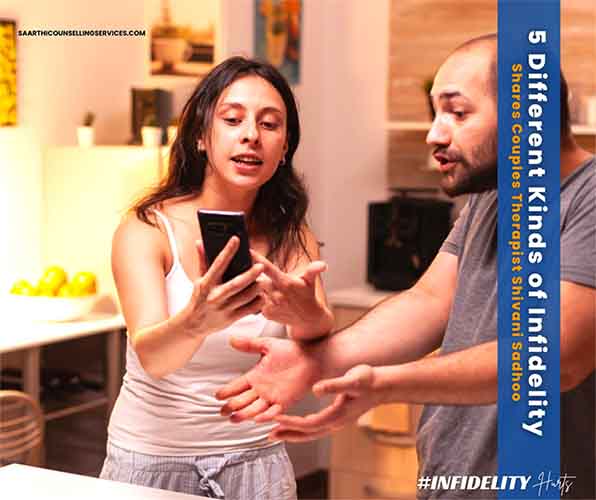Watch Out for the Red and Green Flags of Dating – Shares Couples Therapist Shivani Sadhoo
Getting to know someone actually you really like is a wonderful experience. You feel as if you will conquer the whole world. You stay up the entire night getting to know that special person and daydreaming about when you may see them again. And there is a nice reason for this.
Human beings are designed to bond with other humans. When you date, oxytocin is released into your brain. This helps you to bond. Dopamine releases to make you feel happy and elated when in the presence of your special person.
Due to this, you are not necessarily seeing clearly. You seem to minimize or completely ignore the bad and maximize the good. When you opt for something that does not feel right or a characteristic you do not like, you perhaps justify it or explain it away. This is the reason it is hard to recognize red flags at the initial stages of your relationship. Your body form does not want you to.
Fortunately, there is certainly research on what makes certain couples the “masters” and others the “disasters” of relationships. Relationship counselor Shivani believes you can use it as early as the first date to begin paying attention to whether or not you wish to continue with the other person.
Read on this blog by eminent couples therapist in India Shivani Misri Sadhoo that shares clues that you need to watch out for while you are dating someone.

Red flags
So what actually makes a couple a “disaster”? One of the top predictors of that is the utilization of something according to Dr. John Gottman who called “The Four Horsemen,” which is a play about the “Four Horsemen of the Apocalypse” coming to indicate the end of times.
The Four Horsemen basically are:
- Criticism – Describing flaws in character within your partner
- Defensiveness – Not taking responsibility for your part
- Contempt – Belittling and taking a superior position
- Stonewalling – Shutting out your partner or shutting down
You can begin to notice whether or not these are visible in your relationship even in the initial phases. What may look like?
Criticism
If a person that you are dating, often criticizes you or other people, you may notice them saying words such as “always” or “never.” For instance, “you are always very late” or “you never think about me at night!”
Defensiveness
Defensiveness seems like counter-criticizing, over-explaining, or justifying actions, or playing the victim. If you are dating and bring up an issue that you have and the other individual responds defensively, that could be something to watch out for. It might look like them saying, “I know I keep showing up late but I truly have a very busy job. Why do not you get that?”
Stonewalling
Stonewalling is mostly the outcome of physiological overwhelm. This means the individual that is stonewalling perhaps has a racing heart and a rush of stress hormones. If you are with someone who is stonewalling, it will appear as if the other individual is zoned out or could not care less about what you are saying. You may experience this during the starting conflict. Probably the other person goes disappeared or is offline and becomes unresponsive.
Contempt
This one is quite important to watch out for. Contemptuous is the most damaging of the horsemen. Contempt seems when someone holds on a position of superiority. It could sound like put-downs or mean-spirited sarcasm.
Other instances of contempt are laughing at you (not with you), putting down your own interests or profession, or taking on a position of being better than you in a certain capacity. If someone shows contempt in the initial stages of dating, this is one big red flag. So now that you have looked at what you need to avoid, let us look at what you need to look for.
Green flags
Fortunately, it did not just stop with studying the disasters of relationships. There was an attempt to know what it was the masters did differently. In the research, Dr. Gottman found the antidotes to the Four Horsemen, which are counteractive behaviors for each of the above.
When you are in the process to know someone, look for them. It is a good sign they can manage conflict and show you respect, even while you differ.
Gentle Start-up
Instead of becoming critical, the masters of relationships discuss their problems and complaints by initiating the conversation gently. They also look to follow a formula of “I noticed this, I feel that, I need this” when discussing what is troubling them, instead of being accusatory “You always do this, you need to do that, why don’t you…“
Responsibility taking
Rather than being defensiveness, you want to take proper responsibility for your part. It means that you own even the tiniest piece of the problem when it is there. Individuals who take responsibility listen to their partner when they have a problem, validate the issues, and take pause prior to responding.
This could sound like one partner saying, “Hey, I have noticed that when we go out with your friends, I am left all alone in the corner. I feel truly awkward in those moments. I require you to stay by my side a bit more until I get to know them” (a gentle start-up). In turn, the other individual responds non-defensively by saying, “You are correct. I should not walk away from you like that. I can imagine it is uneasy when you don’t know everyone yet.”
Self-soothing
Everyone gets upset. It is human to have overwhelming emotions momentarily. However, those that do well in relationships seem to take responsibility for soothing themselves and they have partners who are willing to let them take the time they want to self-soothe. It means that when someone needs a break, they take it and the other individual provides them space.
Contempt
To overcome contempt, the individual expressing it requires to lean into recognizing and expressing their own feelings. They perhaps also need to explore their earlier experiences that are leading them to feel anger or hostility toward their partner. Rather than showing contempt and saying “I cannot believe you are late. You disgust me,” a partner who can properly express themselves may say, “When you are late, I feel so upset.”
The conclusion
The initiation of the relationship is full of happy hormones that want you to bond (and mate) with your newfound significant other. Learning to identify the signs of a healthy partner can assist you to override some of those hormones and see a little more clearly.
Watch out for people who are critical, defensive, withdrawn, and contemptuous. The use of these conducts doesn’t imply that you should not be in a relationship with them, but it actually means you need to get curious regarding how they respond when you set boundaries around those sorts of behaviors.
Eventually, you want a partner who is gentle with you (even when you are upset), able to take responsibility for his or her actions (even when it’s difficult), works with you to soothe your emotional systems, and own your past pain and resentment so that he or she don’t inflict it upon you.
Shivani Misri Sadhoo is a Gottman Certified Therapist. Every day several couples and individuals seek her professional advice. Be it about their relationships or psychological or behavioral issues.












